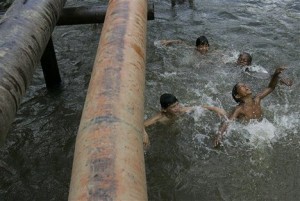 I watched my daughter fall headfirst from a staircase when she was a baby, just a little more than a year old. Time, somehow, impossibly, stood still. She hung in the air for an extra beat — only God knows how — giving me enough time to rush and catch her before she hit the ground. To this day I don’t recall moving toward her. It just happened. The tumblers of the universe were mercifully aligned for us that day.
I watched my daughter fall headfirst from a staircase when she was a baby, just a little more than a year old. Time, somehow, impossibly, stood still. She hung in the air for an extra beat — only God knows how — giving me enough time to rush and catch her before she hit the ground. To this day I don’t recall moving toward her. It just happened. The tumblers of the universe were mercifully aligned for us that day.
I thought about that this morning while watching children bathe in a tiny tributary to the Amazon River in Yuka, Ecuador. The water coursing through its banks is chemically fouled. It runs thick with petroleum and chemical “production water” from carelessly built pits used to hold discharge from nearby oil wells. The pits were dug years ago by Texaco, now Chevron, and their toxic discharge was specifically routed into local streams to save money from which, they knew, local villagers bathe and drink out of necessity. I cannot imagine what company officials were thinking.
The parents of the children a colleague and I watched today know the water causes severe illnesses — cancer, intestinal disease, respiratory illnesses — but there is nothing they can do about it. There is no other source of water for them. These parents are poor and powerless, but they love their children just as intensely as all parents do — as I do. Indeed, their children are all they have. The thought of that dug a pit in my stomach while watching the scene.
I tried to imagine what such abject helplessness must feel like to these parents and I could not. The best I could do, thank God, was think back to that staircase. To them, having a son or daughter drinking from and bathing in the river must be like watching ones’ child fall off stairs over and over again — while being tied to a post. The tumblers are not aligned for them. And if that’s not bad enough, these parents then have to watch the long-term effects of the chemical pollution develop in their children, over a period of years, without having the financial resources to medically treat them.
Through the most improbable circumstances, my company has been given the opportunity to help the children a colleague and I saw today — and thousands of others in their same situation. I’m all in on the effort. But it will be the parents, foremost, I’ll be thinking about when doing the work. Because as bad as the illnesses are — and will be going forward — there is something worse: Watching one’s child in danger without being able to save her.
Good job Bill…